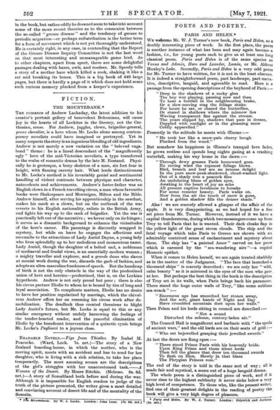POETS AND POETRY.
PARIS AND HELEN.*
WE welcome Mr. W. J. Turner's new book, Paris and Helen, as a doubly interesting piece of work. In the first place, the poem is another instance of what has been and may again become a fashion, i.e., for young poets each to give us at least one long classical poem. Paris and Helen is of the same species as Venus and Adonis, Hero and Leander, Lamia, or Mr. Aldous Huxley's Leda. Secondly, Paris and Helen is a very odd poem for Mr. Turner to have written, for it is not in the least obscure. It is indeed a straightforward poem, part landscape, part narra. tive, descriptive, languid, and agreeable to read. Here is a passage from the opening descriptions of the boyhood of Paris :— " Deep in the shadows of a rocky glen
The boy was playing, pausing now and then To hear a footfall in the neighbouring brake, Or a slow-moving stag the foliage shake.
For hours he sat, or chased the butterflies, Or stared in shallows where the minnow lies Waving transparent fins against the stream. The years slipped by, shadows that pass in dream, Dappled with sunlight or in the gleaming snow Coldly apparelled."
Presently in the solitude he meets with CEnone :- " He took her like a snow-pale cherry bough Plucked from the wood."
But somehow his happiness in (Enone's tranquil love fades, he grows restless and spends long nights gazing at a crashing waterfall, making his way home in the dawn :-
"Through dewy grasses Paris homeward goes.
No roving wind the topmost foliage blows. Bird, branch and leaf are an intense delight In the pure snow-peak-shadowed, cloud-washed light. Out of a shady tree a peacock flies An undulating blaze of golden eyes, Awaking in the heart of joy an ache All present captive loveliness to forsake For some remoter beauty. Paris walks on. Now from the air the touch of snow is gone, And a golden shadow fills the denser shade."
Alas ! we are scarcely allowed a glimpse of the affair of the apple. It is very disappointing, as we had hoped for a fine set piece from Mr. Turner. However, instead of it we have a capital thunderstorm, during which two messengers come up from Troy to tell Paris that he is wanted. Their dark cloaks flap in the yellow light of the great storm clouds. The ship and the fatal voyage which take Paris to Greece are shown with an admirably contrived sense of enchantment and mystery about them. The ship has " a painted Amor " carved on her prow which is caressed by the " sea-wandering airs "—a capital Homeric epithet.
When it comes to Helen herself, we are again treated shabbily as in the matter of the Judgment. " The face that launched a thousand ships " is scarcely described : we see only her " wild, calm beauty " as it is mirrored in the eyes of the men who gaze , at her. But perhaps the best thing in the book is the description of Troy set in its walls, when Paris brings back his paramour. There stand the huge outer walls of Troy, " like some sublime sea-wrack " :- " Enormous age has smoothed her stones away, And the soft, giant hands of Night and Day
Have crumbled mountain dust upon her walls."
Then Priam and his lords sitting in council are described :-
" Not a sound Disturbed the solemn, century-laden air."
The Council Hall is magnificent and barbaric with " the spoils of ancient wars," and the old lords are on their seats of gold :— " Who sat bejewelled grasping their jewelled swords."
At last the doors are flung open :-
" There stood Prince Paris with his heavenly bride. Upon King Priam and those silent lords Then fell the glance that drew ten thousand swords To flash on Ilion. Slowly in that blaze The Phrygian Princes rose."
The end of the story is told in the same sort of way ; all is made fair and mystical, a scene out of a huge languid drama. The whole poem is a distinguished piece of work, and if it never rises to the highest sublimity it never sinks below a very high level of competence. To those who, like the present writer, find one of their greatest delights in the reading of poetry the book will give a very high degree of pleasure.
• Paris and Helen. By W. J. Turner. London : BidarrIck and Jackson• Lbs. net.)


































 Previous page
Previous page